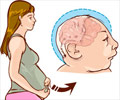Researchers have found no bond between when a couple has sex and any subsequent risk of birth defects such as Down syndrome. Animal studies have
Researchers have found no bond between when a couple has sex and any subsequent risk of birth defects such as Down syndrome. Animal studies have suggested that the timing of sex might increase the risk of birth defects in offspring.
Dr. Joe Leigh Simpson, a professor of obstetrics and gynecology at Baylor College of Medicine in Houston told the press that they haven't yet confirmed one of the known causes of birth defects in lower animals.Researchers have postulated that if a couple has sex either too early before or too late after ovulation, the aging sperm or aging egg might suffer damage that could lead to birth defects in the infant. Prior research on animals confirmed that fertilization that occurred more than a day after the sperm or egg was released from the body was associated with subsequent defects.
The investigators examined more than 1,000 pregnant women at natural family planning clinics in Italy, South America and the United States who had been relying on the "rhythm method" to time their ovulation and sexual activity.
The researchers compared women who had sex at a time deemed "optimal"--either the day before or the day their body ovulated--to women who had sex at a "non-optimal" time: more than a day after ovulation or more than 2 days beforehand.
According to the findings, there were no significant differences among the rates of birth defects or Down syndrome among children whose mothers reported an optimally-timed conception and those who reported a less optimally-timed conception.











